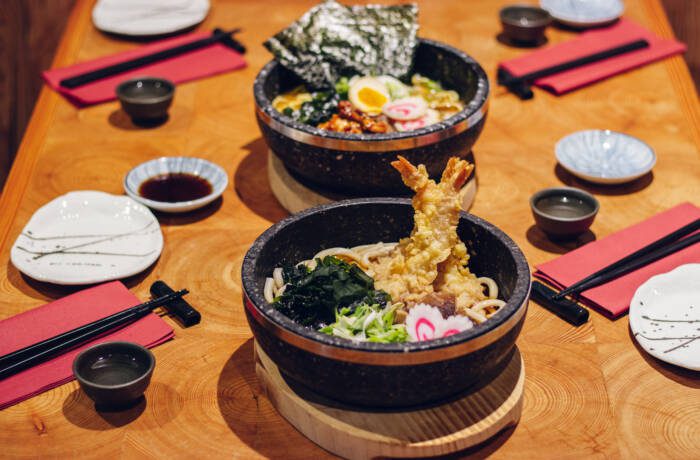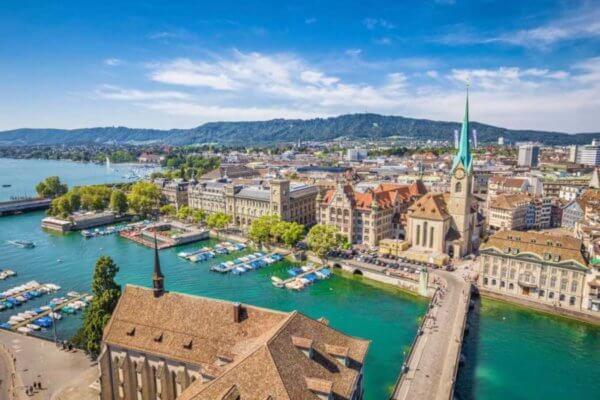
Lauber’s Hotel CERVO uses recycled materials and geothermal heat. Photograph by Darius Sanai
As COP26 brings together world leaders to discuss climate change, Daniel Lauber, owner of the CERVO Mountain Resort in Zermatt, gives us his six guiding principles on how to create a truly sustainable luxury hotel. No greenwash included
Walk into the CERVO Mountain Resort in Zermatt, Switzerland, and you know you are in game-changing sustainable luxury. All the fixtures, fittings, furniture and decorations inside and outside the main Bazaar restaurant are of found, recycled or second-hand/vintage materials, down to the cloth screens separating tables for Covid-19 security. In the rooms, there are no disposable plastic bottles, either in the bathrooms or minibar; no disposable plastic at all, in fact, as even the bedroom slippers are made of recycled felt (they are then recycled again).
And there’s no greenwashing; Lauber knows the difference between offsetting and zero carbon. His aim is for the hotel to have a zero-carbon footprint or better, an immense challenge.
Follow LUX on Instagram: luxthemagazine
Deep boreholes mean all the hotel’s heating is geothermal; electricity is all renewable; produce in the restaurants and bars is discernibly local, sourced from within a 150km radius. All of this is even more challenging in a remote ski resort at 1650m altitude, ringed by some of the highest peaks in the Alps, than in most places.
It’s also one of the funkiest hotels in the Alps; its bar and terrace at the bottom of the Sunnegga mountain piste are the place to be seen at the end of the ski day in Zermatt.
1. Do your homework, set targets and become your own expert
The (geothermal) heating is installed. Now we are trying more and more to go zero footprint or at least a compensated footprint. That’s the next goal, and we are aiming to get to zero waste, maybe by 2024/25.
We work together with myclimate, a Swiss organisation. We are evaluating how big our footprint is. So, the first step is to evaluate and the second step, by the end of 2022, is to try and minimise it with actual plans for things we can change, and what we can’t change then definitely to compensate for it. The end goal is to be zero footprint and then even positive, so we don’t produce a negative footprint at all. As a hotel, that’s quite a challenge, especially as we take into account construction, which always has a negative impact.
2. Make your clients your ambassadors
Doing all this is sometimes (though not always!) more expensive. Then it’s up to us to tell the story to the customer. If they understand it and appreciate it, and most of them do, then we can try to compensate the higher cost of buying with a slightly higher price; and we are lucky that our customers are able to pay that.
3. Go local, but also support family business, and be realistic
The social aspect is very important, as is the economic aspect, because you can be very social and very environmental, but if the business doesn’t work you’re going to lose.
We can work with suppliers who are smaller family businesses to find new ways of being sustainable. I really like that. And I like to give those smaller companies a platform.
For example, most of our ice cream is home-made, but in the summers we have ice cream stands and we sell ice cream from Basel. We could find ice cream that’s closer, but the people producing the one from Basel have a social work space for people who have some health issues or other disabilities and I think that’s nice. It might be 100km further away than other producers, but the mindset they have is so great, it’s worth it.
Read more: Professor Peter Newell on climate responsibility
4. Make a virtue out of your ethical sourcing
Generally, we try to use furniture that also has a sustainable approach. For example, the beds are handmade with organic materials. With whatever furniture we created ourselves, we tried to use local carpenters. In the Bazaar restaurant it was a bit different, it’s more themed, so in that instance we tried to work with young designers and companies in Morocco to support emerging designers or the all-women enterprises there. The chairs, the cushions, the carpets were made for us by small enterprises and that’s nice. It’s different to just ordering a fake Moroccan-style cushion produced anywhere.
5. The hard work is on what clients can’t see
It was quite an easy change to be plastic free in the amenities and rooms. It’s good that the customers see that. The bigger challenge to being plastic free is when it comes to the supply chain. Some stuff we need to order comes shipped stupidly wrapped up. And now that’s the second goal. We can’t do it alone, but we try to talk with those companies and ask if they can ship it differently, to see if they can use multi-reusable packaging, for example.
6. Create a virtuous circle and inspire, but don’t proselytise
We have a lot of feedback when customers say, “Ah this is a good idea”, so we do what we can to inspire customers and staff. If you inspire 10 people, it’s already worth it, and if those 10 each also inspire another 10, then it quickly escalates.
To be inspiring is very important for a hotel but it should never pushy. It’s great to inspire guests but if they don’t care that’s fine, too. Inspiring people can also be a bit educational, but I don’t think it’s our job as a hotel to educate.
Find out more: cervo.swiss





